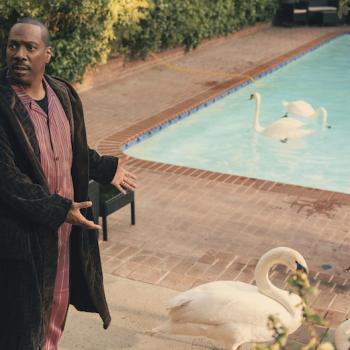
Andrew Lincoln as Rick in The Walking Dead, photo courtesy AMC
Judgment Day
Rick is ready to exact a little Old Testament retribution on Negan and his not-so-merry band of lieutenants. And given what viewers know of Negan, we understand. I don’t know if anyone in The Walking Dead’s long, sadistic history has taken such joy in making pain. In last season’s premiere, he killed fan favorites Glenn and Abraham—with his bat wrapped with barbed wire, no less—and almost forced Rick to cut off his son’s own hand. In a world filled with unimaginable evils, he’s about as evil as it gets. He’s a grinning devil in a leather jacket.
And Rick plans on exorcising him.
“We end them!” He tells his followers in a pre-battle pep talk. “We don’t celebrate it. We don’t’ have shame about it, either. … There’s only one person who has to die.” And Rick says he’ll do the honors personally.
But the show suggests—and has long suggested—that Rick can sometimes teeter on the edge of inhumanity himself. He rarely goes too far in that direction: He doesn’t go to bat on someone’s skull like Negan has. But when he stabs a Savior guard and the immobilized guy says something not to Rick’s liking, Rick cuts loose a zombie to eat the man alive: Not exactly a Dudley Do-Right thing to do.
He has another moral lapse before the battle begins, too.
When Rick and his forces line up just outside Negan’s compound, Rick gives Negan’s lieutenants a chance to step down and give themselves up. (He gives no such assurances to Negan, naturally: No mercy for him.) During this last-chance opportunity, Rick begins to count down from 10—just like you might to “encourage” a pouting 5-year-old to eat his broccoli. Only when Rick hits the number seven, he opens fire. Tough luck for anyone who might’ve surrendered around three or four, apparently.
Hey, I get it: The world of The Walking Dead is unimaginably harsh. It’s a dog-eat-dog world out there—sometimes a human-eat-human one—and mercy is rarely rewarded. Rick values humanity and all its higher values, but sometimes, he believes that such values will have to wait.
But when we scrap our values because they’re inconvenient to follow, do they mean much of anything? Rick may be trying to kill a devil in Negan, but in so doing he seems to slip into Negan’s world—the corrupting world of violence and cruelty. It’s like the One Ring in Tolkien’s The Lord of the Rings: Sure, turning Sauron’s ring against Sauron himself seems like good strategy … except that it turns its user into someone equally as bad. That’s not the way.
So what is?













